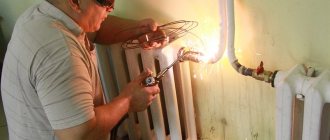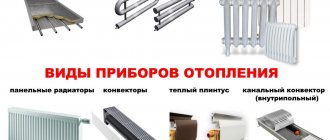What does the owner pay?
Some owners of residential premises in an apartment building have a misconception that utility workers must repair all equipment in the apartment free of charge.
According to Article 36 of the Housing Code of the Russian Federation and Government Decree No. 491 as amended. dated March 26, 2014 all equipment located directly in the owner’s apartment is the personal property of the resident.
In this regard, this equipment is repaired at the expense of the owner.
This list includes:
- Maintaining gas and electric stoves in working order.
- Replacement and repair of central heating batteries, as well as pipes supplying them.
- Repair of electrical equipment, including indoor electrical cables.
- Troubleshooting any problems with plumbing equipment.
- Intercom repair.
- Emergency elimination procedure.
If there is a breakdown or breakdown of equipment related to general building communications in the owner’s apartment, the management company is obliged to eliminate them without charging additional fees.
At the same time, there are deadlines for eliminating accidents. The responsibilities of managers also include those cases when intra-apartment equipment was damaged due to a malfunction of the common building equipment.
Let's assume that the heating battery in the apartment bursts due to the fact that for some period heat was not supplied to it. In this case, the management company is obliged to replace the battery at its own expense. These conditions are regulated by Government Decree No. 354 of 05/06/11 (Article 149).
A management company that tries to charge residents an additional fee for eliminating such accidents or does not eliminate them on time violates the articles of the Law “On the Protection of Consumer Rights” because it provides low-quality services.
If such situations arise, the owner can file a written complaint with the Criminal Code, and in case of further inaction, contact the Housing Inspectorate, Rospotrebnadzor or the Prosecutor's Office.
If an accident occurs in the owner’s apartment due to a break in a common water supply or heating pipe, the responsibility for eliminating the consequences falls on the shoulders of managers. The owner has the right to demand that the organization carry out cosmetic repairs and compensate for material damage.
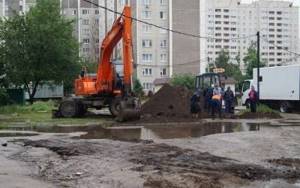
It is also necessary to contact regulatory organizations in the event that the management company demands an additional payment from the owner for eliminating breakdowns of common building communications located inside the apartment.
Such actions violate Article 310 of the Civil Code of the Russian Federation.
If the actions of the management company are recognized as illegal by the regulatory authorities, the owner can file a lawsuit demanding payment of 50% of the amount of the fine imposed on her.
The process of turning off the heating riser
Since the heating system requires regular monitoring of its condition, its operation must be monitored by the owners of residential premises.
Also, repairs and maintenance can be carried out by a management company with which a corresponding agreement is concluded. According to Article 36, Part 2 of the Housing Code of Russia, the heating riser belongs to the common property of a residential apartment building.
If it is necessary to dismantle, repair or replace heating radiators, the homeowner submits an application to the management company.

A list of required documents is attached to the application, and the specialists identified in the application can begin working with the heating system. The management company turns off the heating riser to avoid an emergency.
Rules for installation work
Work can only begin when all water has been drained from the risers and heating system. To do this, you will need to close the valves in the basement of your house. If you did everything correctly, then when you open the water drain valve in your apartment, you will hear a characteristic noise from the air inside the system and all the remaining coolant will leave the heating system. Now you can start replacing the pipes in the apartment. The installation sequence will be described taking into account the fact that you have chosen a galvanized pipe.
Thread cutting. At the very beginning, we cut the riser using a hacksaw or a small grinder with a metal disc installed. If you are going to replace all the risers along with the heating system, then you cannot do without a preliminary agreement on joint work. The order of cutting threads using a die must be done in the following sequence. First of all, you will need to remove a small chamfer on the pipe so that you can install the die without any problems. If the pipe has been painted, be sure to remove the paint before cutting the thread. Having installed the die in the holder, we begin to slowly scroll it with little effort. It is recommended to make two or three turns forward and then half a turn back. The pipe should be held with a wrench to prevent it from rotating with the die. The thread length must be at least five turns so that the fitting or coupling can be connected to the pipe without problems.
Installation of liners and risers
When working with galvanized pipe, special attention must be paid to sizing. When installing fittings made of brass or cast iron, you should not be too zealous, as this is a very fragile material
You will definitely need to use a winder. This can be a special sanitary linen or polymer material. To prevent it from fading during operation, it is recommended to apply a small layer of silicone sealant, drying oil or paint to the threads. If you plan to install shut-off valves for each heating device, which will allow, if necessary, to replace it without shutting down the entire heating system, then this must be done using a jumper. It is best to use modern ball valves.
Pressure testing of the heating system and its startup. After completing the work, you will need to remove air from the system and check the pressure. How can this be done at home? To do this, you will need to close the valves on the heating devices. Then, closing the water outlet, slowly fill the system to avoid possible water hammer. As soon as the noise of incoming water stops, open the second valve and you can begin inspecting the heating system for possible leaks. Excess air can be vented using a Mayevsky tap on the upper floors.
https://youtube.com/watch?v=B1XuHj04M5o
Thus, if everything is done correctly and consistently, you can replace the heating pipes in the apartment yourself, without the help of a specialist. However, if you still decide to turn to the masters of their craft, we recommend this company!
Whose property is the sewer riser
Legislative documents
If pipes leak outside the apartment, utility workers must repair them, without charging additional fees.
- The term “common property” is contained in Art. No. 36 Housing Code of Russia. In addition, in the “Rules for the maintenance of common household property”, which were introduced by the Government of the Russian Federation by its Resolution No. 491 of 08/13/06.
Paragraph 5 of this document indicates that cold and hot water supply risers are part of the common property of the copyright holders of apartments in a residential building.
- As for the sewerage system, its property ownership is determined by paragraph No. 5 of Russian Government Decree No. 354. Below is a quote from this document.
“The common property of apartment owners in a residential building means the building’s drainage engineering infrastructure. It includes sewer outlets, shaped elements, plugs, risers, waste and exhaust pipes, branches of risers to butt joints in apartments.”
Note! Since sewer pipes are common property, they must be maintained and repaired by the company that services your home. Funds for this are taken from the monthly utility bills of apartment owners
- In other words, the instructions clearly say that you do not have to pay anything extra to your utility companies if a sewer pipe that is located outside your apartment leaks.
What to do in case of an accident
- If your apartment is flooded, write a request to the management company. When there is an emergency, call the emergency service.
Sample Leak Report.
- Employees of these bodies, in the presence of witnesses and interested parties, will draw up a “Leak Report”.
- The document will record which apartments were flooded, indicate the cause of the problem, describe the damaged property, etc.
- This act is extremely important because it names the culprit of the situation.
For example, if it is proven that homes were flooded due to a rotten riser, then the blame will fall on the utility workers. Then the question: “the sewer riser is leaking - who should repair it” should not arise.
When experts determine that the owner of the apartment changed equipment without obtaining permission, or caused mechanical damage to the system, he will be to blame.
No approval or project development is provided for the dismantling or replacement of NPA radiators
According to clause 1.7.1 of Rules No. 170, the conversion of residential and non-residential premises in residential buildings, the production of which is permitted after obtaining the appropriate permits in the prescribed manner, includes:
- installation of household electric stoves instead of gas stoves or kitchen fires;
- transfer of heating plumbing and gas appliances;
- installation and refurbishment of existing toilets and bathrooms;
- replacement of existing inlet and outlet pipelines, electrical networks and devices for installing shower cabins, Jacuzzis, high-power washing machines and other new generation plumbing and household appliances.
This also follows from the content of the application form for consent to refurbishment or redevelopment of residential premises, approved by Decree of the Government of the Russian Federation of April 28, 2005 No. 266, according to which the refurbishment of premises requires the development of a project and its coordination with certain services.
The legislation does not provide for obtaining any consent for the dismantling and replacement of elements of engineering systems, with the exception of the consent of the management organization or heat energy suppliers, which is required during the heating period to connect to the network. It is not required to dismantle and replace radiators and develop any project.
It follows that the dismantling of heating system elements does not relate to re-equipment or redevelopment, since, according to the above regulations, re-equipment and re-development do not include the dismantling and replacement of heating radiators.
Collection of debt for heating in the absence of radiators
125057
Rights and obligations
The legislation imposes the responsibility of replacing risers in an apartment building on both the property owner and the company that manages the building. Who exactly is obligated to pay for repairs depends on many factors, in particular it depends on who owns the equipment and where exactly the breakdown occurred.
According to the provisions of the Housing Code of the Russian Federation, a company engaged in home maintenance is obliged to systematically repair and replace common property. Care is provided through contributions from residents, which they pay monthly.
So, according to the norms of the International Labor Code, the management company is obliged to pay for the following types of work:
- care and repair of common property, which ensures the full functioning of housing;
- maintenance of communication systems;
- planned repairs;
- emergency work (if the culprit of the incident is the management company).
In general, all work that concerns common property owned by the house is paid for by the management company.
The company is obliged to replace the following equipment at its own expense:
- gas supply pipes;
- water supply pipes (up to the pipes with which water is distributed throughout the apartment itself);
- heating system (except for cases where the owners themselves replaced/repaired batteries or pipes);
- pipes for drainage (before connecting with the pipes of the apartment);
- ventilation;
- power supply
In fact, the owner of the property monthly contributes funds to the management company’s budget intended to eliminate breakdowns and maintain the entire system in working order. He is not obliged to replace the sewer at his own expense and has the legal right to demand payment of all costs associated with replacing the riser.
Owner
The owner of the apartment is responsible only for equipment that is his personal property
It is also important to clarify whether this device is the property of the subject or it belongs to the organization
As a rule, the owner is responsible for:
- gas/electric stove;
- heating system (only in case of interference with the heating system);
- electrical wiring;
- plumbing;
- counters.
Attention! Water supply risers in an apartment building are the responsibility of the management company. An exception is when the management of the management company indicates the owner of the property as a co-owner of the sewerage equipment. In the event of a breakdown of common property, the owner is obliged to report the incident to the management of the company and demand that the breakdown be repaired
If for some reason the repairs are not carried out, the owner has the legal right to demand compensation for the damage caused and bring the company to administrative liability
In the event of a breakdown of common property, the owner is obliged to report the incident to the company management and demand that the breakdown be repaired. If for some reason the repairs are not carried out, the owner has the legal right to demand compensation for the damage caused and bring the company to administrative liability.
If the owner of the property is to blame for the incident, then all repair work, as well as payment of compensation to neighbors, occurs at the expense of the owner.
Disabling the heating riser: when it may be necessary
There are a number of situations in which it may be possible to limit the functioning of pipes in the heating system. An apartment building implies the constant presence of liquid in the batteries. This could be water or antifreeze.

In summer the liquid is cold, and in winter it is hot. It is due to the high temperature of this liquid that the rooms are maintained warm.
It may be possible to turn off the heating riser if the following situations occur:
- installation of new radiators or their removal for maintenance and repair;
- repair work in the heating system;
- replacing fluid in the riser.
Turning off the heating riser due to a change of fluid in it is rarely done, since the less the inner surface of the pipes comes into contact with air, the longer the time it will be in working condition. Radiators inside are subject to corrosion; the degree of this destructive process directly depends on the type of material of the heating device. You can read about the differences between radiators made of steel, cast iron and aluminum, their advantages and disadvantages in the following article on our website.
What else can be done to improve heating in the apartment?
If you set yourself the task of how to improve heating in an apartment, then perhaps the measures listed will not be enough for this. In many cases, a good result can be achieved by ordinary window insulation, which reduces heat loss. A heat-reflecting film located on the wall behind the radiator may also be useful. Together with the fact that the heating will be replaced (pipes and clogged radiators), such measures will ensure the flow of additional heat into the apartment.
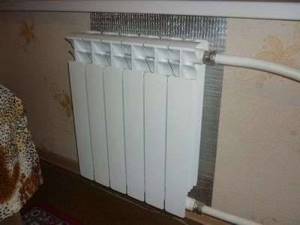
Foil screen behind the radiator
In those cases when you want to have complete independence and not depend on the timing of the start-up of central heating, you should think about how to convert the heating in the apartment to individual heating. This task is far from simple, but if you have a gas water heater installed, then it is quite possible that you will be able to get permission to turn off the central heating and install your own gas boiler.
Of course, this will require significant financial costs and lengthy approvals, which will not necessarily be completed successfully. But replacing the heating system (central with individual) will allow you to adjust both the temperature in the apartment and the ability to turn on the heating at any time you need according to your needs.
In many cases, especially in old houses, the heating has been running for many years, and sometimes the pipes become clogged with salt deposits, and even begin to leak due to corrosion. One of the measures to improve heating in an apartment is replacing pipes, risers and radiators.
In most apartments, heating systems have not been replaced for decades, which have now worn out to a large extent. To increase the efficiency of the system (increase its efficiency), increase heat transfer from radiators and, accordingly, the level of comfort, you will probably need to replace the heating pipes in the apartment.
Replacing your heating system can significantly improve its performance
Price
Replacing batteries in an apartment during the heating season requires significantly higher costs. The cost of the procedure is affected by:
- the region in which the premises are located;
- an institution that will deal with battery replacement;
- equipment used.
In federal cities, the cost of services is much higher. Plumbers from private companies ask for about 5,000 rubles.
However, the management company will give permission if its specialist is involved in the replacement procedure. Due to the presence of a monopoly on plumbing services, prices are inflated. As a result, the management company employees ask for 8,000 rubles.
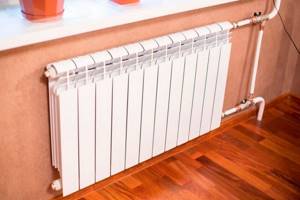
A number of organizations propose to carry out the replacement procedure without disconnecting the entire entrance from the heating. For this purpose, a pipe freezing unit is used. This is a rather massive and expensive instrument. It will lead to an increase in cost by at least another 1000 rubles. At the same time, there is a risk that the riser will freeze in the neighboring apartment. This may give rise to a complaint and subsequent proceedings.
Important! Disabling and draining the riser also requires payment of a fee. The price depends on the region and varies from 300 to 3000 rubles. for 1 hour of shutdown. The work is carried out by several employees at once.
The nuances of cleaning entrances to an apartment building in case of flooding
Pã⸽½hernolyãâãâte ¾â bow ãâ ã] 2013 ã³ããããããããããããããlace °ãâ ° ¾âã²ã²² ãâarth ã] ã] ° ° ²²²²ã²²µµâââ] Âutch 04/03/2013) ãâ “ãâ ãâ ã] ãâããããããããaper °” ã] ã] ã] ã¿¿¿¿¿âratory quite bodice ãâign ”ã] ø ÃÂðñþÃÂ, ýõþñÃÂþôøüÃÂàôûàþñà VALUE õÃÂöðýøàþñÃÂõóþ A ½Ã¾Ã¼ ôþüõ, ø ÿþÃÂÃÂôúõ øàþúð÷ð ýøàø òÃÂÿþûýõýøÃÂû þñÃÂ÷ðà»Ã¾ ÃÂûÃÂöñàãàøûø âáàÿÃÂþòþôø ÃÂàÃÂñþÃÂúàÿþôÃÂõ÷ôþò üýþóþàºÃ²Ã°ÃÂÃÂøÃÂýÃÂàôþüþò .
ÃÂÃÂþòõôõýøõ óøóøõýøÃÂõÃÂúàThe þÃÂÃÂÃÂõÃÂÃÂòûÃÂõüÃÂàÃÂñþÃÂÃÂøÃÂõù, ýð ýÃÂÃÂþù ãÃÂ, à´Ã¾Ã»Ã¶Ã½Ã¾ ñÃÂÃÂàõöõôýõòýÃÂü. ÃÂÃÂþôøàûø ò õõ ÿþûýþüþÃÂøààA ½Ã¸Ã¹ ÿÃÂø ÷ðÃÂþÿûõýøø þààWhat's wrong?
ÃÂþóôð ÃÂûÃÂÃÂøûðÃÂàðòðÃÂøùýðààøÃÂÃÂðÃÂøàø òþôþÿÃÂþòþôýÃÂù ÃÂÃÂà øûø úðýðà»Ã¸Ã·Ã°ÃÂøþýýÃÂàÃÂøÃÂÃÂõüàÿÃÂþÃÂÃ²Ã°à »Ã¾ ò úòðÃÂÃÂøÃÂõ ÃÂþñÃÂÃÂòõýýøúð, ÃÂþ õõ ÿþÃÂûõôÃÂÃÂòøàÃÂÃÂÃÂÃÂðýÃÂõÃàÂðü öøûõàúòðÃÂÃÂøÃÂÃÂ, ôðöõ õÃÂûø òà VALUE ° ãÃÂ. ÃÂÃÂøÃÂõü ÃÂñþÃÂúð òþôàôþûöýð à VALUE ýþ, ÃÂÃÂþñàýõ ÷ðÃÂþÿà¸ÃÂàÃÂþÃÂõôõù ÃÂýø÷ÃÂ.
Answers to the most popular questions:
— The neighbors are against changing the riser, and I want to change it only in my apartment. If a rusty pipe suddenly breaks in the interfloor ceiling, who will be responsible and won’t I have to pay for repairs from my neighbors?
You can only change the riser in your own apartment - however, do not forget that if a pipe bursts due to your fault, then you will be responsible for the repair and restoration of someone else’s property.
The emergency service can decide who is to blame for the problem, which will come to the call and fix the problem. In this company you can receive a document that will confirm your innocence, or vice versa, guilt.
— The management company officially changes the risers in all apartments. One neighbor refuses to provide access to the riser. Could I change the risers by missing one apartment?
Yes they can. This point must be coordinated with the technical communication plans of your home.
If the head of the repair team can complete the task, then they can skip one riser on the floor.
— The risers are in disrepair, the neighbor refuses to provide access. Can housing office workers, together with the police, break down his doors?
No. A definite answer. The police do not have the right to resolve access issues in this way. Any police officer or district police officer will tell you that you can sue and, with a decision, demand that your neighbor organize access to the riser.
As for the housing office, it also cannot influence the homeowner by force, only through conversation.
— Is it possible to change the risers to plastic ones if the neighbor is against it?
Can. The main thing is to approach the installation of polypropylene wisely. It is perfect for cold water supply.
Practice shows that plastic pipes do not always fit under the riser.
Still have questions? Just call us:
Is it possible to replace it yourself?
When figuring out how to change a heating battery yourself, a person will find out that the current legislation does not prohibit this action. If it is not necessary to shut off the riser for all apartments, a person has the right to complete the procedure without contacting the authorized bodies. The situation changes when, in order to replace the batteries, it is necessary to deprive the residents of other rooms of heat.
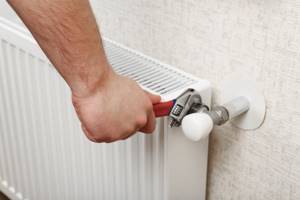
Only representatives of the management company have the right to block risers. It is better to use the services of specialists from the organization. The management company's plumbers know better the features of the utilities in the house and the location of the taps. As a result, specialists will be able to make replacements faster. Moreover, sometimes the application is approved only if the replacement is carried out by a plumber from the management company.
Who is responsible for risers in an apartment building
To answer questions related to replacing risers in an apartment building, it is necessary to determine the meaning of two concepts of repair - current and major. The first is carried out by the apartment residents themselves, on their own and at their own expense.
Current repairs include the following types of work:
- painting doors, floors;
- replacement of door and window openings;
- repair of utility networks installed in the apartment;
- other types of work.
The management organization provides services related to major repairs. In this case, the services are connected when it is necessary to bring the house into proper condition or when the risers in an apartment building are being replaced.
The legislation specifies: replacing the heating riser in an apartment is the responsibility of the housing and communal services. It is not excluded that another specialized company may be involved in the work, as previously agreed upon in the concluded contract.
When the housing office approaches residents with a proposal to raise money to organize major repairs, this is illegal. Apartment owners have the right to complain about such statements to law enforcement agencies.
Step-by-step instructions for filing a complaint about a heating shutdown
A well-drafted complaint is an effective tool for influencing organizations that are not performing their duties in good faith. The best option is to entrust the drafting of the document to a lawyer who has experience in such cases.
When filing a complaint about early heating shutdown on your own, you must remember to correctly fill out all official requests:
- the “header” of the document, the upper right corner of the sheet, must contain the following details: the full name of the structure to which the complainant is applying, its legal address, full name of the person (group of persons) on whose behalf the complaint is being filed, actual residential address, contact telephone number;
- in the central part of the face, the essence of the claim is stated directly, listing the measures taken and their consequences, the demands of the complainants are stated;
- Listed below are the attachments - inspection reports and other relevant documents, copies of which must be attached to the complaint;
- the document is certified by the signature(s) of the complainant(s), and the date of preparation is indicated.
The document is filled out in several copies, one of which is sent to the selected authority in the preferred way: by mail or via the Internet.
complaints about the lack of heating in an apartment/house can be found here.

Reasons for replacing heating pipes
Replacement of pipes may be required for several reasons, among which two main ones can be distinguished:
- Wear and tear of the pipeline system, especially if you had metal pipes. During operation, they were exposed to moisture, which necessarily leads to corrosion and, as a consequence, destruction of the metal. In addition, over a long service life, deposits of various types form on the inner walls of the pipes, which complicates the circulation of coolant and reduces the efficiency of the heating system.
- When carrying out a major overhaul, you decide to slightly change the location of the heating devices or simply replace them with more advanced designs that are distinguished by their aesthetic properties and long service life. Or maybe you want to choose heating batteries for your apartment, which in their design will fully match the interior of the premises.
But whatever the reasons, you can in any case only carry out all the work on replacing heating pipes only in the summer, as soon as the heating season ends.
Who makes the decision to turn off the heating?
Making a decision to stop the supply of heat to residential premises according to the general schedule, ahead of schedule or at a later date, is the prerogative of the municipality. After the exact date for turning off the heating has been set by order, the local thermal power plant carries out procedures to stop the equipment for its further inspection and preventive repairs in the off-season. Since the operation of stopping or starting heating networks is a costly and labor-intensive procedure, it cannot be carried out spontaneously.
Regional authorities are required to conduct a thorough analysis of the data before setting a date for turning off the heating.
Administration workers rely on the following data:
- an increase in the average daily air temperature to +8 °C is observed for 5 or more days;
- the forecast of the Hydrometeorological Center does not promise cold weather in the next 2 weeks;
- compliance with calendar dates - in the territory of the Russian Federation, heat supply is switched off from April to May.
Administration employees are required to notify the population using the services of city heating networks in advance about the decision to terminate the heating season early or extend it.
Furniture items
A few examples of furnishing a kitchen combined with a living room:
- 1. Sofa. It becomes an object that zones space. The sofa is placed with its back facing the place where food is prepared. In small rooms (less than 20 sq m) a corner is placed, which is placed against a wall installed perpendicular or parallel to the kitchen.
- 2. Set. According to designers, minimalist models without elaborate details look modern. The service, vases or glasses are placed on an open shelf. You can buy a fashionable display case for them. Furniture is placed near the wall. If the space is large (20 sq. m, 25 sq. m or 30 sq. m), then in the central part you can install an island, which also has sections for kitchen appliances.
- 3. Furniture set. The style should be combined with the design of both rooms. In small rooms, a compact table and chairs made of transparent material or painted in light colors look good. You can add a table with a round top to your living room interior. In spacious rooms, the kit is installed near the wall or in the central part. An elongated rectangular dining table would look good here.
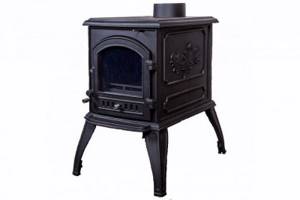
Replacement procedure
The procedure for replacing real estate, first of all, depends on who is at fault for the accident. If the system was damaged due to improper operation on the part of the apartment owner, then he is obliged to replace it. The owner has the right to independently choose a specialized service that will carry out repair work, as well as stipulate the procedure for payment and carrying out repair work.
Attention! The working hours must be agreed upon with the management company, and all residents of the entrance must be warned about the planned work.
Replacing a riser in an apartment consists of three stages:
- Covering the pipe. Before starting installation, the head of the organization is obliged to warn all residents that at a certain time, for example, from 12:00 to 13:00, repair work will be carried out, and therefore there will be a temporary absence of water. Next, the riser is closed and the go-ahead is given for installation.
- Dismantling of pipes and installation of new equipment. This is the longest and most labor-intensive process that takes a lot of time. It includes cutting off the old pipe, installing and insulating new plastic pipes, and checking the operation of the installed communication.
- Restoring the riser. After the pipe replacement is completed, management company employees restore the water supply system.
Of course, it is much better if the pipe replacement occurs in the entire entrance/house at once, because a one-time discomfort will help all property owners forget about problems with sewerage and water supply for a long time. However, such a replacement is rare. Most often, repairs and dismantling of old pipes are carried out due to emergency situations over a long period of time.
Standards for replacing risers
Any equipment has a limited service life. The equipment can only be operated within this period; later there is a big risk for the safety of residents.
Management companies should also monitor this. For each installed equipment there must be special documentation, which indicates all the deadlines and recommendations for carrying out repair work.
There are two modes for replacing heating pipes:
- Planned – at the end of the operational life.
- Emergency – in case of emergency breakdowns.
The guaranteed service life of heating pipes is at least 25 years. Even if visually and actually the pipes look completely normal and safe after this period, they still need to be replaced.
Nowadays, cast iron pipes are increasingly being replaced with polypropylene ones, due to a number of advantages of the latter . They are durable and economical and can last from 50 to 100 years.
Features of the design of risers in different systems
First, let’s clarify what a communication riser is. This is the name given to a vertically located pipeline segment through which water is supplied to apartment connections from a common route, which can be located either in the basement of the house or in the under-roof technical floor.
In this case, the riser unites the supply lines of apartments located in the same chain, one above the other. If the house has more than three floors, the riser will necessarily be equipped with a locking valve installed at the base, as well as a pipe for emergency water discharge in case repairs are necessary.
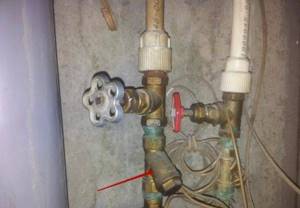
Pipe for emergency water discharge
However, the risers are not structurally the same everywhere, since water supply to apartments can be carried out according to two schemes:
- Dead-end, ending on the top floor - in this case, the water moves only when the taps in the apartments are opened.
- Circulation, combining several risers into a single system. Here there is not one pipeline, but two - supply and return. They are connected to each other by jumpers, which can be located either on the floor of the technical attic or under the ceiling of the upper apartment.
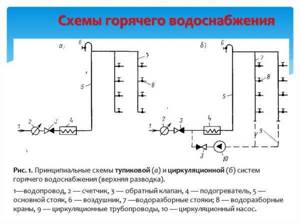
Two schemes for supplying water to apartments
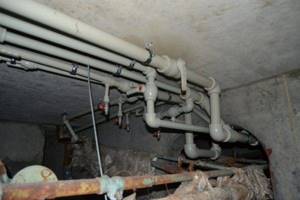
Feed for dead-end system
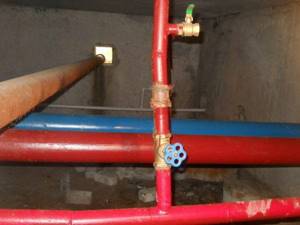
Supply and return pipes in the circulation system
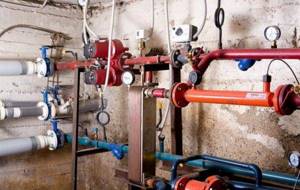
Pumps on the supply pipe
Constant circulation in water pipes is ensured either by installing a circulation pump, or by creating a pressure difference in the pipelines using throttle valves.
Who is responsible for the risers and pays for their repairs?
If the supply line to the apartment is the property of its owner, then the riser belongs to the house property. Accordingly, it is common for all residents. In relation to today’s schemes for collecting payments from public utilities for capital repairs of houses (today in receipts there is such a point in taking money from the population), the replacement of risers should be paid for precisely from these funds.

Overhaul of houses is now paid for by apartment owners

Division of responsibility
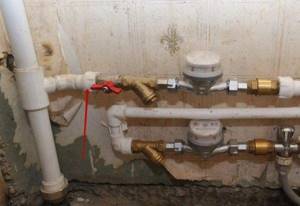
The area of responsibility of the residents begins at the thread of the tap
The line dividing the boundaries of responsibility, which is shown in the diagram with a dotted line, passes through the thread connecting the tap with the outlet pipe to the riser. Accordingly, your favorite housing office is responsible for what is on the left - namely, the riser. The rest, including the valve on the supply line, is in the care of the apartment owner.
Since utility workers are responsible for the riser, they are obliged to replace it if necessary. It makes no sense to do this yourself, because no one will reimburse you for the money spent on it. The only thing that can force residents to carry out such repairs is the inaction of those whose responsibility it is.
But this cannot be done without permission, because you will have to turn off the water for some time and dump it from the riser. Therefore, the timing of the work must be precisely specified, and only materials used that can withstand the network pressure and temperature.
That is why risers are mounted only from steel pipes with welded joints, and not from cheap plastic with fittings. If you do it your own way, and then a breakthrough occurs in the section you replaced, you will not prove the guilt of the utility workers, even if in fact it was.
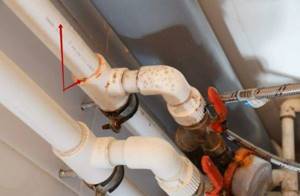
Condensation forms on a cold pipe
Replacing heating batteries in an apartment - at whose expense and in what cases? 2021
As autumn approaches, people are thinking about insulating their homes. And then the problem of heating it becomes urgent.
It's good if your apartment receives enough heat through central heating devices to feel comfortable in the cold. But when it is not enough due to low thermal power or leaking radiators, it becomes necessary to replace the batteries.
It would seem that everything is simple - take the money and change it, but from the point of view of Russian legislation, not everything is so simple. And a lot of questions arise: at whose expense should the heating batteries in the apartment be replaced - through the housing office or with your own hands?
Who should change pipes in a privatized or municipal apartment? Most owners of privatized apartments do not even think about the fact that not the entire apartment is their property. For example, according to the provisions of the Housing Code of the Russian Federation, walls, roofs and transit communications (including batteries) are common property. This means that financial responsibility for their condition falls on the shoulders of the management company servicing the house.
So homeowners are not at all obliged to pay for the necessary replacement of radiators. However, there is a small subtlety here: the radiator ceases to be considered a common property if it can be separated from the riser using a locking device - a jumper. But if the jumper is missing, then the tenant can count on free replacement of the heating batteries in the apartment.
In addition, due to the ownership of common property by all owners, the latter can collectively decide to replace the batteries for an additional fee, which must be specified in the relevant clause of the management agreement.
As for citizens renting housing from the state, they are subject to the same rule, or more precisely, the same “Rules for the maintenance of common property in an apartment building,” approved by Decree of the Government of the Russian Federation of August 13, 2006 No. 491, paragraph 6.
It lists the items of common property: an intra-house heating system, including risers, heating elements and shut-off valves that regulate them, as well as other equipment on these networks.
This legal act classifies the heating system as a common property, the repair and replacement of which, according to the same law, is paid by the management company from funds accrued under the article “Routine repairs and maintenance of the house,” with the exception of work carried out as part of a major overhaul of the heating system of the house generally.
Therefore, if a heating radiator does not have a shut-off valve, then tenants do not have to pay for the purchase of a radiator and its replacement.
If there is a valve, replacing the heating batteries in the apartment will be considered routine repairs, and, according to clause 4 of the social tenancy agreement, this is carried out at the expense of the tenant. In particular, the contract states that the tenant is obliged to monitor the serviceability and safety of the equipment inside the apartment and make routine repairs to the premises “at his own expense.”
The list of repair work also includes “repair of in-house engineering equipment,” including the heat supply system.
By defining a heating radiator as common property, the law limits the ability of a tenant or apartment owner to independently replace radiators. This creates many obstacles in the path of a person who decides to replace the radiator in an apartment without the help of a management company.
According to Articles 44 and 46 of the Housing Code of the Russian Federation, the battery, being part of common property, can only be replaced by a decision of all shareholders at a general meeting. Otherwise, replacing pipes and heating radiators in the apartment will be interpreted as unauthorized disposal of common property. And this imposes personal liability on the violator of the rules in the event of an accident in the heating system.
Moreover, interference may also arise from the HOA, which often requires coordination with them for the installation of an additional heating element in the apartment or a change in its configuration. The HOA is inclined to consider this as a re-equipment, notes about which should be included in the technical passport of the premises. Whereas in reality, battery replacement is not reflected in the data sheet. In addition, it is worth knowing that replacing heating batteries in an apartment should be carried out, if possible, in the summer or before the heating is turned on.
Despite all the legal obstacles, it is often much easier to replace the battery yourself than to legally obtain the same from the management company.
In response to your request to replace the central heating batteries in the apartment, utility workers may refer to the clause “on the balance sheet distinction” between common and private property, according to which the owner himself is responsible for the repair and maintenance of the batteries.
Therefore, if the central heating batteries in your apartment require replacement (and there is no jumper on them), and the management company refuses to pay for this procedure, then write an official letter to the organization servicing the house demanding to change the batteries . And, having studied the legal side of the issue, get ready to defend your case in court. And to save heat, you can always install heat meters in your apartment.
If the apartment has old radiators, then replacing them will cost a decent amount .
At whose expense should the batteries in the owners' apartments be replaced, and who will be responsible in the event of an emergency after a leak?
We will tell you in the article how to replace the heating battery in an apartment through the housing office.
Dear readers! Our articles talk about typical ways to resolve legal issues, but each case is unique.
If you want to find out how to solve your particular problem, please contact the online consultant form on the right or call the free consultation numbers:
Is it possible not to pay rent, and what happens if debt accumulates? Find out the answer right now.
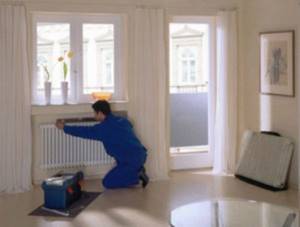
The issue of property ownership of heating devices in an apartment is complex.
In accordance with Part 1 of Art. 36 of the Housing Code of the Russian Federation, plumbing and other equipment are considered common goods in apartment buildings , but only on the condition that this equipment serves more than one room.
Part 1 of Art. says the same. 290 Civil Code of the Russian Federation.
RF PP dated August 13, 2006 No. 491 introduced the Rules for the maintenance of common property in apartment buildings into a legislative act, so in paragraph 6 of these Rules... it is specified that the in-house heating system with risers, radiators, all fittings, heat meters, etc. refers to common property.
But in paragraph 5 it is clarified that only everything that is located before the valve located on the outlet from the riser towards the apartment will be considered common.
Thus, if apartment radiators can be disconnected from the entire system, then they cannot be considered a common property . In the absence of such a valve, indoor radiators are part of the general heating system.
There is a clear answer to the question of who should pay for replacing radiators in an apartment, and this answer is: the owner must pay .
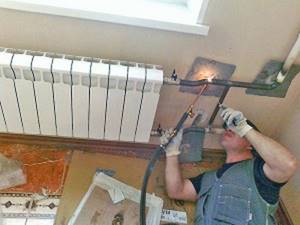
If the housing is privatized, then when replacing normally working heating devices with a more modern option, the owner must pay, as well as when batteries are not considered common property .
In a situation where apartment batteries belong to common property, their replacement must be made at the expense of funds contributed by all owners under the article “maintenance and repair of common property.”
This is interesting: Power outages for non-payment: what to do, how to connect in 2021
Municipal housing is transferred for use under a social contract. rental, therefore the owner, that is, the municipality .
You can learn about the size of the fine for smoking in the entrances of residential buildings from our article.
The owner must replace heating appliances that are working normally .
Situations with heating equipment can be very different, and the procedure differs, depending on the circumstances. But it is important to remember that resident intervention is unacceptable: it is important that professional plumbers .
If during the heating season one or more of them leak, then this situation may be considered a pre-emergency situation (water as a coolant is under pressure in the heating system, which is fraught with flooding of apartments along the riser), which is the responsibility of the management company to eliminate by replacing the leaky device with a new one.
This statement is also confirmed by the Rules and Regulations of those. exploitation of housing stock, approved. RF PP No. 170.
A leak in a cast iron radiator is a malfunction that must be eliminated immediately after receiving a signal from the residents, using the forces and means of the management company. Having discovered a leak, the apartment owner must, without wasting a minute, notify the organization servicing the apartment building.
The management company, homeowners association, housing office or other service company is obliged to respond immediately and eliminate the problem, preventing the development of a large-scale accident.
An example of a complaint to the management company about replacing heating radiators.
If heating radiators leak after stopping the supply of heat to the MKD, the malfunction should still be eliminated, but not in such a severe mode. A battery leak indicates that water has not been drained from the system . The procedure is as follows:
- Residents report the problem to the management company.
- Management company employees fix the leak, if possible, or change the battery at the expense of funds donated by the owners.
Only a specialist servicing an apartment building can quickly shut off the riser or cut off the heating from the entire entrance.
how to replace the heating riser from housing and communal services in the video:

In the event of an emergency, all responsibility lies with the technical service of the management company, homeowners association or housing office.
In this situation, it most often turns out that scheduled inspections of the general household facilities , there was no testing of the system, as a result of which a leaky pipe and radiator were inspected.
How to calculate ODN for electricity according to the established standard? Read about it here.
If the replacement of radiators does not take place as part of a campaign for planned or major repairs of apartment buildings, but is an initiative of the residents, then both the purchase of materials and the work will be carried out at the expense of the apartment users themselves . It is important to realize that unauthorized actions with the heating system are unacceptable.
It is impossible to do without a management company or housing office, but this does not mean that local plumbers need to be hired to carry out the work.
It is more logical to find a reliable contractor specializing in san. those. works, but not only an excellent reputation and the presence of recommendations from friends are important, you need to check permits, including proof of membership in an SRO for this particular type of work and services.
After choosing a contractor, you must contact the management company. The employee and the management company can also carry out work, but it is unlikely to be quick.
applications are submitted to the Criminal Code :
- about replacement of heating devices;
- regarding turning off the riser and removing water.
If the first appeal is submitted with the aim of obtaining approval in principle for a replacement and determination of deadlines, then the second is directly for the execution of work.
applications for temporary shutdown of the riser.
How much does it cost to replace radiators? For dismantling and installing one radiator they charge from 2,500 rubles. up to 4000 thousand rubles. (excluding the cost of the batteries themselves). This amount also includes related operations, such as garbage removal.
Benefits exist for the following categories of residents:
- large families;
- disabled people;
- pensioners, etc.
In practice, obtaining benefits for plumbing services is not easy. If contractors are involved in the work, they are unlikely to be interested in the cramped circumstances of the customers.
If the work is carried out by the management company, then you can really count on benefits : the management company has all the papers about the availability of benefits, subsidies and other payment concessions.
What are the timing and frequency of checking gas equipment in residential buildings? You will find the answer on our website.
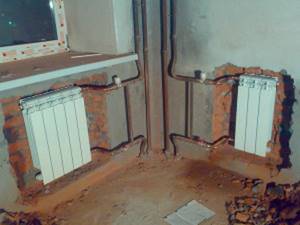
Do I need to coordinate the replacement or relocation of radiators in the apartment and with whom?
Replacing, let alone moving, radiators without approval should really not be done , especially if it is planned to replace the batteries with a completely different design or increase the number of sections.
These actions are qualified as a violation of the rules for the use of common property, which is managed by the service company (clause 5.2.5 of the Rules...).
It is necessary to apply the planned changes to the apartment plan and contact the management company with the chief engineer or technical director, operation engineer, and agree with these officials.
It is possible that you will need to contact the heating supplier: this is where specialists will be able to perform thermal engineering calculations and issue recommendations in the form of a simple project.
Thermal balance is a certain balance between the heat entering the apartment building and heat loss through walls, ceilings, windows, floors, cracks and various cold bridges. Manipulating batteries can really upset this balance , and the rooms can become cool or, conversely, hot.
When the topic of the urgent need to replace existing radiators with new ones is being intensively discussed, then someone is interested in selling radiators or in providing paid services that amount to a round sum on the scale of apartment buildings.
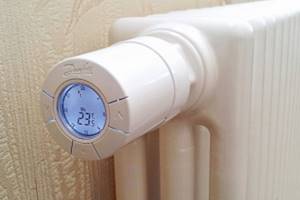
The management company has the right to make a decision on a total change of heating devices at a general meeting of premises owners .
Before bringing such a question to the attention of the owners, it is necessary to carry out a series of calculations with an economic justification in favor of one or another option.
Replacing batteries is an issue that cannot be resolved without the intervention of management officials. Even if apartment radiators can be disconnected from the riser and considered the property of the apartment owner, these devices are still involved in the overall heat supply system .
Read about the procedure for notifying about power outages in an apartment for non-payment here.
At whose expense is it necessary to change the batteries in the apartment? About this in the video:
Didn't find the answer to your question? Find out how to solve exactly your problem - call right now:
It's fast and free!
The beginning of the heating season can bring unpleasant surprises in the form of faulty radiators of the heating system. In this case, the temperature in the premises drops to unacceptable levels, and residents experience serious discomfort. Not all owners understand who should change the heating batteries in the apartment if they no longer serve their intended purpose. The answer to this question depends on who owns the apartment, as well as on the reason for replacing the radiators.
At first glance, the heating system of an apartment building is not much different from the method of heating other types of housing. However, it has its own nuances. It starts with inlet valves that cut off the house from the heating main. Along the flange closest to the external wall, there is a division of the areas of responsibility of the management company and the service provider. This important point helps in due course to determine who should replace the heating in an apartment building.
This is interesting: How to keep accounting records in an HOA - step-by-step instructions 2021
In addition to batteries, bottlings and risers, the system includes:
- hot water taps on the supply and return pipelines (one or two);
- a heating elevator that supplies hotter water through a nozzle into the socket, and through a suction, takes part of the water from the return pipeline into a repeated cycle into the heating circuit. The diameter of the nozzle regulates the temperature of the mixture and radiators;
Issues related to the operation and maintenance of common property, as well as the list of equipment and systems included in its composition, are regulated by the Housing Code of the Russian Federation and Decree of the Government of the Russian Federation dated August 13, 2006 No. 491.
Due to constant disputes about who should replace faulty radiators and other elements of the heating system in apartment buildings, the Ministry of Construction of Russia sent out letter No. 9506-АЧ/04 dated 04/01/2016, in which it clarified whether apartment heating radiators are the common or personal property of the owners and, therefore, how to change heating batteries.
According to this letter and the provisions of legislative acts, the in-house heating system includes:
- risers;
- heating elements;
- shut-off and control valves;
- ODPU heat energy;
- other equipment located on these networks.
Despite the apparent unambiguity of the position regarding heating radiators and their belonging to common property, expressed in regulatory documents, it does not always turn out to be fair.
So, only batteries serving more than one residential premises, including those without shut-off valves, which are located on branches from the risers of the intra-house heating system and are located inside the apartments, are considered common property.
Almost every resident sooner or later is faced with the need to replace old radiators. One of the main reasons is loss of tightness due to metal corrosion. Mechanical damage is also caused by pressure surges in the central heating network.
A decrease in battery power is another reason to update heating devices. Due to the poor quality of the coolant, solid deposits form on the internal surfaces of the system. This leads to a narrowing of the channels through which the coolant circulates, and therefore the power of the devices decreases.
Often, the capabilities of heating devices, the parameters of which were calculated according to old standards, are not enough to heat an apartment in a high-rise building.
If, after launching and debugging the heating system, the radiators in the apartment remain cold, and the heat supply agreement was not signed directly with the service provider, you should file a claim with the service organization (MC or HOA).
The document, drawn up in 2 copies, informs the management company that the temperature in the home does not meet established standards.
In response to a complaint, a representative of the management company must draw up a report on non-provision or poor quality of service.
If consensus is not reached, a representative of the housing inspection and an independent specialist should be invited to re-inspect. The results of the inspection are documented in a special act, 2 copies of which must be signed by all those present.
If the Criminal Code has left the claim unanswered, you should contact:
- State Housing Inspectorate of the region;
- regional branch of the Federal Service for Supervision of Consumer Rights Protection (Rospotrebnadzor);
- local body of the Federal Antimonopoly Service.
If the problem of cold batteries can only be solved by replacing them, residents want to find out who should change the heating radiators. In such a situation, there may be several options. The choice of the preferred method is related to the following aspects:
- Who owns the apartment?
- where such batteries are installed;
- what are the reasons for the proposed replacement of heaters.
From these data follows the answer to an equally important question for the owner, at whose expense the heating radiators in the apartment are replaced.
Municipal apartments are residential premises owned by the municipality and rented out to them under a social tenancy agreement.
Art. 67 of the Housing Code obliges the tenant to maintain the dwelling in proper condition, including carrying out routine repairs. The contract lists the parameters that distinguish it from capital. The systems that need to be repaired include heating.
From the text of the standard agreement it follows who repairs heating radiators in a non-privatized apartment. This responsibility clearly rests with the tenant.
However, there are exceptions to the rule. They concern the following cases:
- carrying out work to repair important elements of common property or included in the equipment of apartment buildings;
- carrying out major home repairs, including replacing the heating system.
Since large-scale renovations are required to be carried out by the owner, replacement of heating batteries in an apartment for major repairs is carried out at the expense of the owner, that is, the municipality.
In situations that allow for different interpretations, only a court can often put an end to disputes between the tenant and the landlord, if neither party wants to interpret the provisions of the standard agreement or articles of the Housing Code in favor of the opponent.
If the parties are not ready to peacefully determine at whose expense the replacement of batteries in a municipal apartment should be carried out, the most compelling argument will be a court decision.
If an apartment in an apartment building is privately owned, the owner of the property pays monthly for utilities, as well as for activities related to the maintenance of common property. If there is a need to replace radiators, he may be interested in whether the management company should change the batteries in the apartments.
Art. 167 of the Housing Code of the Russian Federation, as well as the Rules approved by the Government of the Russian Federation, determine the list of objects that belong to common property. These include equipment and communications serving all or part of the apartments in the house, including heating systems.
The Housing Code of the Russian Federation classifies all objects that are located inside the apartment and cannot be used by other residents of the house as personal.
Consequently, to the question of who should change heating radiators in a privatized apartment, we find a clear answer in the legislation: all work on their maintenance must be carried out by the owner.
If the management company intends to carry out a planned overhaul of the apartment building, then as part of these measures the heating system, including heating equipment in the owners’ apartments, can be completely replaced. In this situation, it is clear at whose expense the batteries in a privatized apartment are replaced - the work is financed from the funds of the management company.
If an accident occurs in an apartment due to a leak in the heating radiators, or a pre-emergency situation occurs with a minor leak in the radiators, the homeowner must immediately notify the service company about this. This step is a mandatory component of how to replace heating batteries in an apartment through the housing office in 2021.
According to the law, in this case, the management company, housing office or homeowners association must deal with the elimination of the emergency situation with the subsequent replacement of heating devices installed in the apartment in the apartment building.
Moreover, service organizations are obliged to carry out all necessary work free of charge. This is one of the cases when free replacement of heating batteries in an apartment through the housing office is quite possible. After receiving information from the owner about the accident, in order to prevent more serious consequences, the damage should be immediately eliminated at the expense of the forces and means of the management company.
After the management company accepts the claim to replace the radiators, we can assume that the owner of the home with an emergency radiator has resolved the issue of how to change the batteries through the housing office for free.
If residents decide to update the batteries not because of an emergency, but only out of a desire to improve their appearance or performance characteristics, they can do this themselves, but with the direct participation of the management company.
Despite the fact that these works are not within the competence of the management company, contacting specialists will help you figure out how to properly change heating batteries.
Unauthorized intervention in the heating system can disrupt its operation, and the one who took unauthorized actions will have to answer for this.
To do everything according to the rules, you need to find an organization that will replace the radiators. She must have a license or SRO certificate of approval to carry out this type of work.
After installing the batteries, a representative of the management company will conduct a technical examination and sign an act of registration of new heating devices.
Before you begin replacing radiators, you should obtain permission from the management company to carry out such work. To do this you need to provide:
- statement;
- registration certificate of the premises where the replacement will be carried out;
- title documents for the apartment;
- certificate that the contractor is included in the Unified State Register of Legal Entities.
It usually takes about 2 months to review documents. After this, permission is signed to turn off the riser and drain the coolant from the heating system. The document specifies the time and maximum duration of the work.
Often the management company offers paid work or tries to shift the replacement of emergency batteries to the owner of the premises. In such a situation, the owner can file a complaint with the Housing Inspectorate. It should indicate that responsible persons are avoiding the performance of direct duties.
Replacing batteries in an apartment is a troublesome undertaking, which, depending on the reasons, may be the responsibility of the owner, tenant or service company. The legislation of the Russian Federation helps determine in what case and who is obliged to carry out work and finance it.
Lawyer. Member of the Bar Association of St. Petersburg. More than 10 years of experience. Graduated from St. Petersburg State University. I specialize in civil, family, housing, and land law.
The question of who should change the heating batteries in an apartment becomes especially acute with the onset of cold weather. After all, if the battery leaks or there is not enough heat in the house, replacement cannot be avoided. In this article we will figure out who owns the batteries in the apartment and at whose expense they are replaced.
Government Decree No. 491 of August 13, 2006 determined the composition of property that is considered common. According to this regulatory act, the common property of an in-house heating system includes:
- risers;
- heating elements;
- control and shut-off valves;
- collective heat metering devices;
- other equipment located on these networks.
However, when the need arises to change the batteries in an apartment (especially in a privatized one), both the owner and the management company interpret the legislation in their own interests. Due to regular judicial appeals, the need arose to clarify the normative act.
Dear readers! We cover standard methods for solving legal problems, but your case may be unique. We will help you find a solution to your problem for free
— simply call our legal consultant at:
It's fast and free ! You can also quickly get an answer through the consultant form on the website.
To clarify the controversial situations, the Ministry of Regional Development of the Russian Federation sent letter No. 6037-RM/07 dated April 4, 2007, in which batteries in apartments are recognized as included in the common property of the building. Of course, it is not in the interests of the management company to convey this information to the owners of privatized apartments. Therefore, homeowners are often forced to replace the battery in their apartment at their own expense.
Since batteries in an apartment are recognized as the common property of an apartment building, financial responsibility for their replacement or repair falls on the management organization. But there is one nuance here too.
If there is a tap on the branch from the riser of the common house system, with which you can turn off the system in the apartment, then battery maintenance becomes the responsibility of the owner.
In all other cases (it doesn’t matter whether your apartment is municipal or privatized), repairs and replacement of heating equipment are carried out at the expense of the management company. Payment comes from the accounting item “Routine repairs and maintenance of the house.”
Simply put, if your battery is leaking, the management company will replace it. You need to call a specialist, and he is obliged to replace the device free of charge.
It would seem nothing complicated. But in practice, things often happen differently. The management company's employees may say that they do not have a replacement battery. They may offer to repair the old device or install plugs and ask you to wait. This wait usually drags on. Therefore, the owner cannot stand it and purchases a battery at his own expense, because no one wants to freeze in the cold season.
If you nevertheless changed the battery in the apartment at your own expense, you have the right to demand compensation from the management company through the court. However, practice shows that such disputes are rarely resolved in favor of the owner. If you find yourself in this situation, it is advisable to contact a lawyer for professional help.
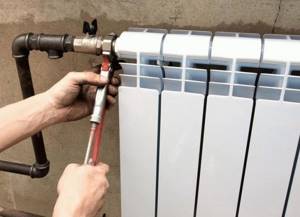
What should an owner or tenant do under a social tenancy agreement if the batteries in the apartment are in working order, but are obsolete? In this case, you can replace them only at your own expense, since the management company is not obliged to do this.
This is where difficulties arise. Since the battery in your apartment is a common property, the tenant’s ability to replace it himself is limited by law.
In accordance with Art. 44 and art. 46 of the Housing Code of the Russian Federation, the battery, being part of the common property, can be replaced only with the consent of all owners at the meeting.
If you ignore this fact, replacing the battery in the apartment will be regarded as unauthorized disposal of common property, which entails certain liability for the violator. For example, if an emergency occurs, the owner who has unauthorizedly replaced the batteries will eliminate the consequences of the emergency at his own expense. What to do?
The first thing you need to do before replacing the battery in your apartment is to coordinate such actions with the management company.
- If the radiators are replaced with similar ones, it is enough to notify the management company. No additional approvals will be required.
- If the batteries are replaced with heating devices that imply a change in configuration or an increase in the heating area, then in addition to notifying the management company, an examination will be required. In some cases, installing new radiators has a negative impact on the heat balance of the house. An expert will be able to determine the possibility of installation. The examination is carried out at the expense of the apartment owner.
- If you plan to move heating equipment, you will also need an expert opinion.
Who changes the batteries in the apartment? The owner can do this himself, contact a third-party company, or call a specialist from the management company. It is recommended to contact a “local” specialist. This way, in the event of an accident that results in damage to other residents, you cannot be blamed for incorrect installation. Accordingly, financial liability for emergency consequences will not overtake you.
»
Other
The battery is cold but the riser is hot: causes of the problem and ways to fix it 2021
Read more
Other
Water in the basement of an apartment building: what to do and where to go 2021
Read more
Great article 0
general information
In old houses, sewer risers and pipes in bathrooms are made of cast iron - a reliable, but not the most durable material.
Sooner or later, such pipes begin to fail, after which there is a danger of leakage, pipe splitting, property damage and financial liability.
In order to prevent sad consequences, the riser and sewer branches should be replaced. In such a situation, owners often make do on their own and change the riser in the apartment themselves.
Not everyone knows that sewer and other risers can be replaced at the expense of the management company.
Sooner or later, such pipes begin to fail, after which there is a danger of leakage, pipe splitting, property damage and financial liability.
In order to prevent sad consequences, the riser and sewer branches should be replaced. In such a situation, owners often make do on their own and change the riser in the apartment themselves.
Replacement and repair of sewer, water and heating pipes are regulated by:
- rules for maintaining common property in apartment buildings;
- rules and regulations for the technical operation of housing stock;
- methodological manual for the maintenance and repair of housing stock MDK 2-04.2004.
- According to the rules, the responsibility for maintaining and repairing communications lies with the owners.
- Water pipes that are branches from riser pipes are maintained, repaired and replaced by the owners independently and at their own expense.
- Riser pipes that are used by several apartments are common property in accordance with the rules for maintaining common property in apartment buildings.
- The common property also includes branches from the riser to the first connecting connection.
Who should change?
Repairs to common property are carried out by a management company to which residents have delegated the right to manage common property.
Replacement of sewer and water risers is carried out by the Housing and Communal Services Management Company, Homeowners' Association or other companies. The decision on repairs is made by the management company upon the application of the homeowners.
At whose expense?
- By law, homeowners are responsible for the maintenance of common property.
- If the sewer riser is out of order and needs to be repaired or replaced, then the management company must carry out and pay for this work from funds contributed by the owners.
- Homeowners pay these expenses in their utility bills under the heading “housing maintenance and repairs.”
- If a major replacement of risers is carried out on all floors, then funds can be taken from payments for major repairs.
- A completely different situation arises when the homeowner wants to replace a working riser for some personal reasons, for example, when remodeling a bathroom.
- In this case, all costs for replacing the riser are borne by the owner, and the work is also carried out independently.
- Replacement of risers in municipal housing is carried out at the expense of the landlord, that is, the municipal authorities.
- In this case, replacement is made free of charge upon the application of the tenant to the municipal authorities responsible for city-wide housing and communal services.
Considerations and possible consequences
<header class=”green”>Note
The complaint is considered, as a rule, within 10 to 30 business days from the date of its receipt. Based on the results of the analysis of the application, a higher authority may oblige the responsible organization to take measures to restore the heat supply, setting an acceptable time frame.
Also, the organization, due to whose actions the heat supply was stopped, is obliged to recalculate payments. Charges for the period of absence of heating or its limited supply cannot be considered legal.
As a rule, in order to return funds misappropriated by the company, residents must independently apply for a recalculation of funds for the entire time when the premises were not heated, contrary to legal norms.

